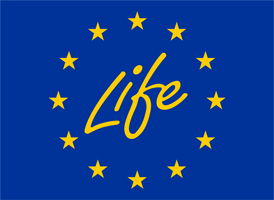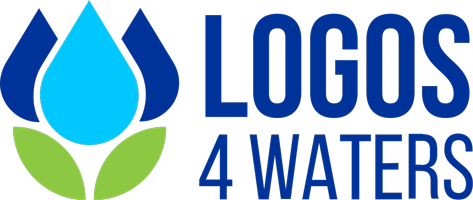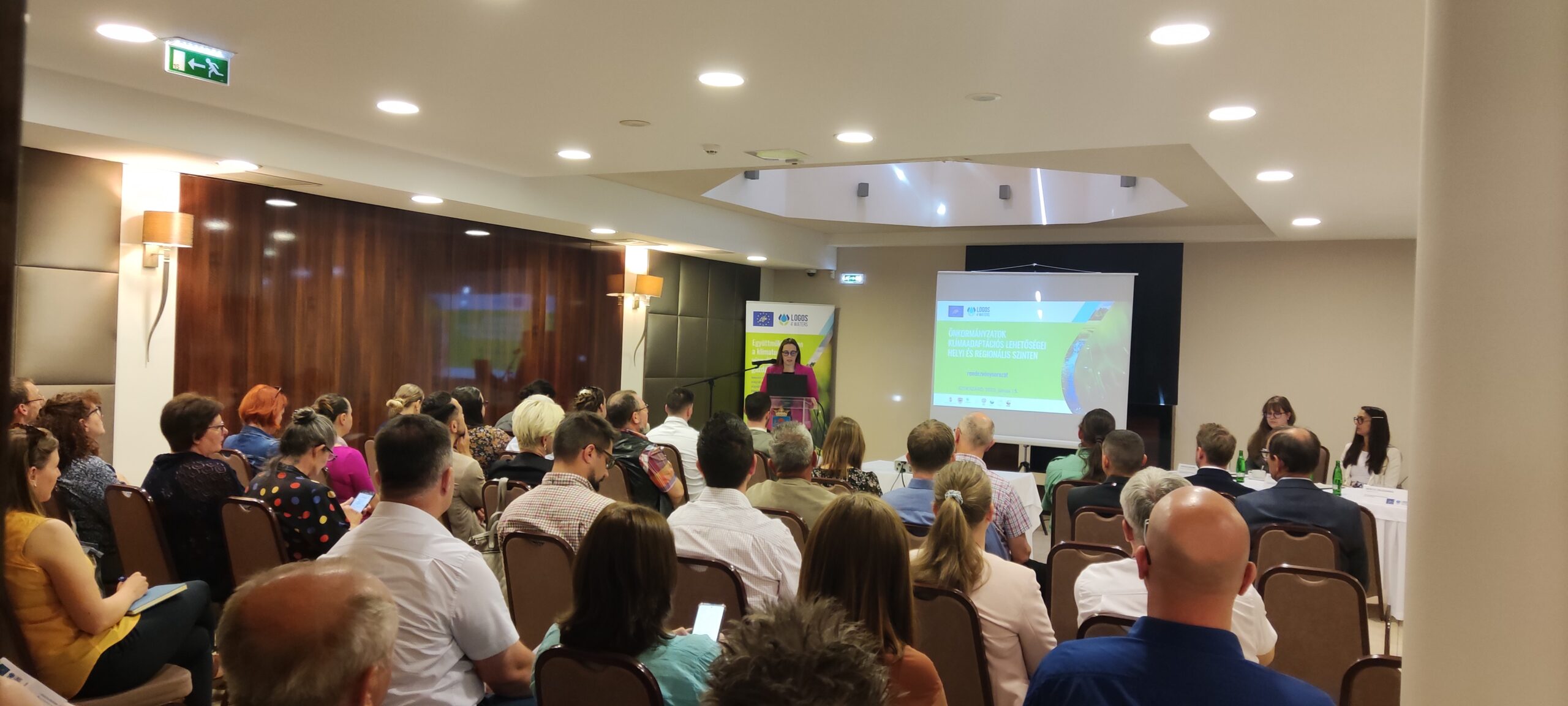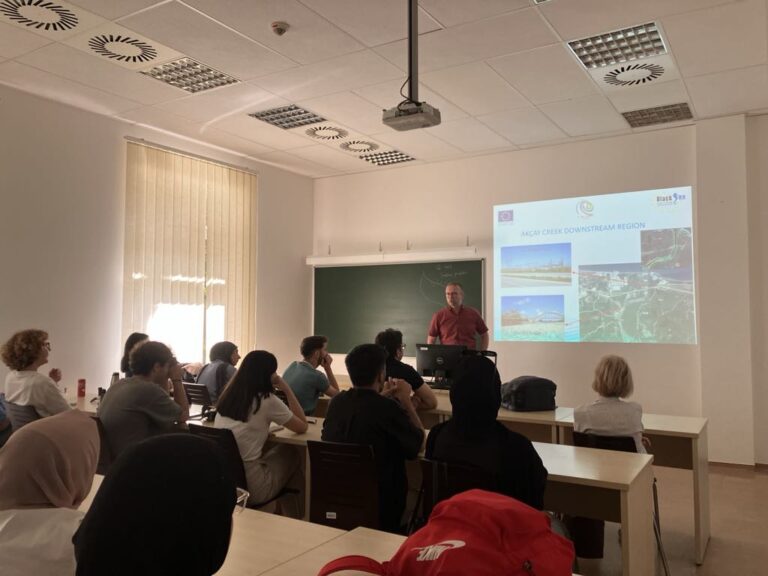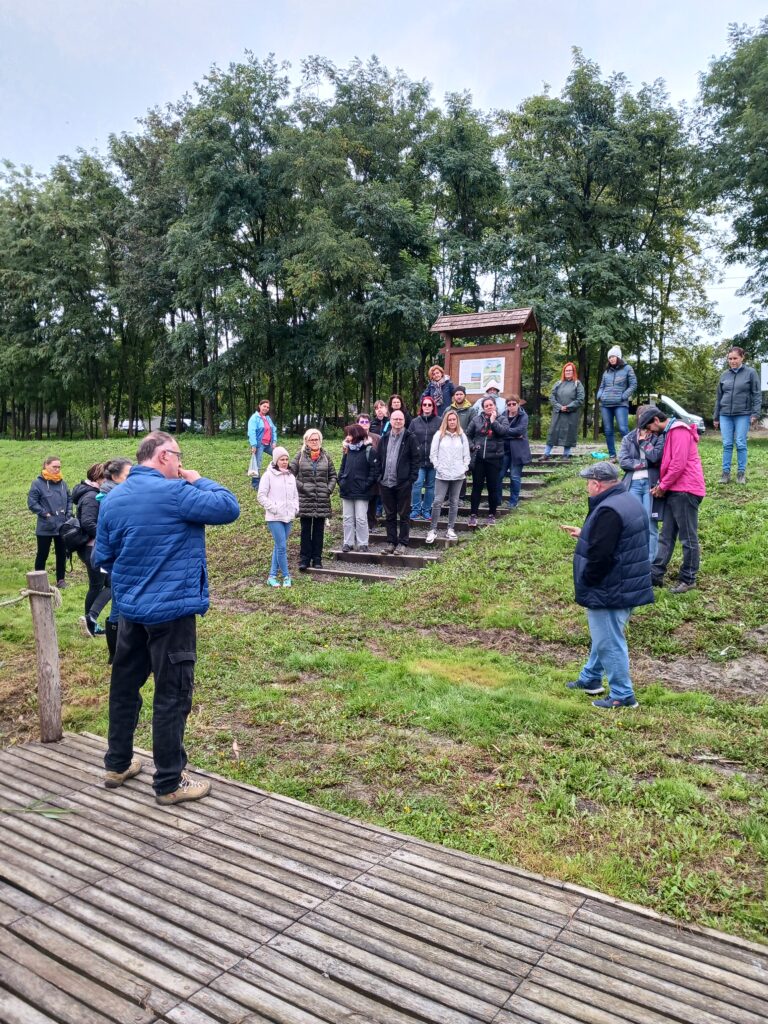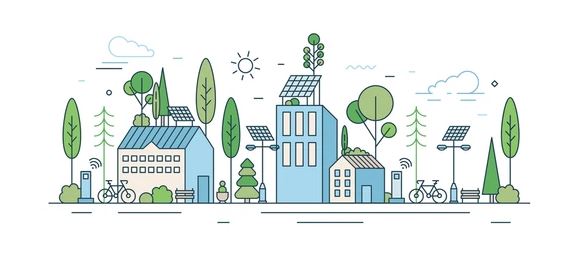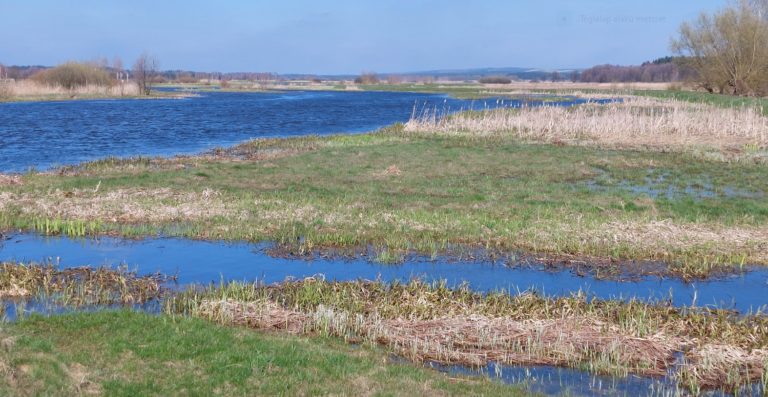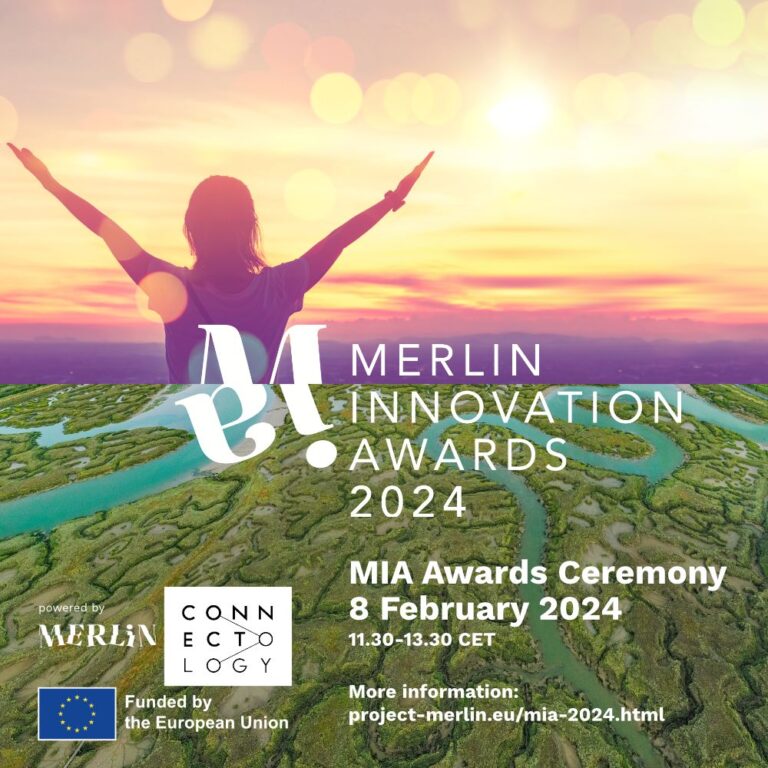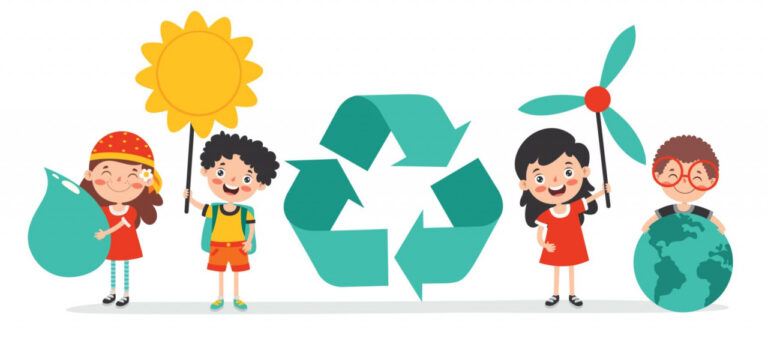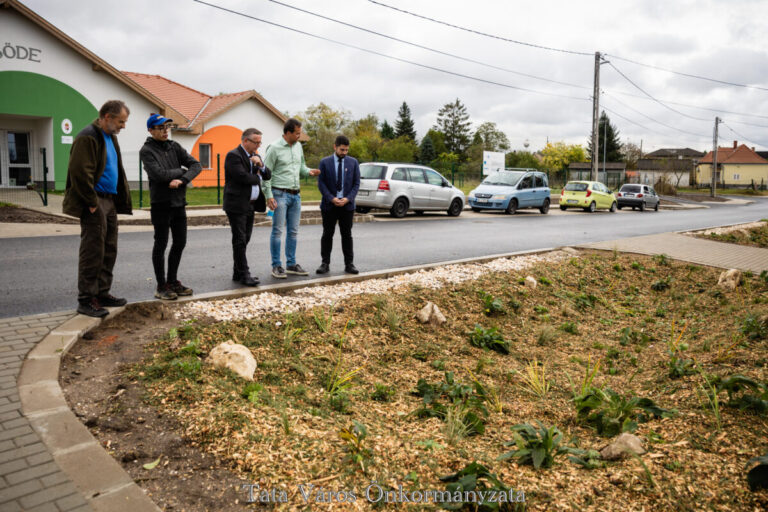Within the framework of the LIFE LOGOS 4 WATERS project entitled „In cooperation for climate-conscious river basin management” the series of the nationwide professional events entitled „Climate adaptation opportunities of municipalities at local and regional level” was held between 25th May and 15th June 2023 at 7 locations (Szeged, Tata, Visegrád, Keszthely, Miskolc, Szolnok and Szekszárd) in all regions of the country. The main goal of the series of events was to provide information for municipalities on the adaptation at local and regional level in the field of sustainable water management and its role within the adaptation to climate change, and to raise awareness of the opportunities offered by the Catchment Support Programme announced within the framework of the project.
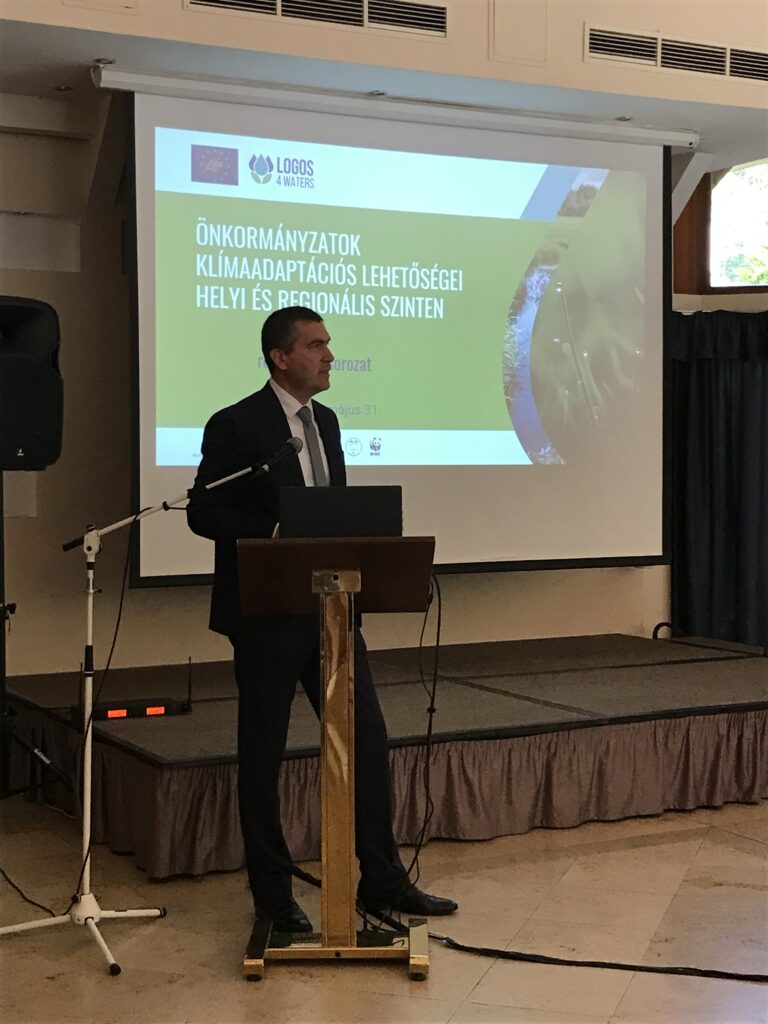
At the opening ceremony of the event in Tata (31.05.2023), Dr. Miklós Dukai, State Secretary for Municipalities of the Ministry of Interior greeted the audience
The presentations showed at the events were structured in a varied, but at the same time in a connected way, highlighting current events and presenting the good practices and examples involved in relation to the given location. At certain locations of the event series, Dr. Miklós Dukai, State Secretary for Municipalities, Zoltán Kivés, Deputy State Secretary for Municipalities and Zsuzsanna Hercig, Head of Secretariat, greeted the participants on behalf of the State Secretary for Municipalities of the Ministry of Interior. Then, as the first presenters, the experts of the WWF Hungary Foundation (Klára Kerpely, Viktor Mátyás Farkas) presented the current situation of the country in the light of climate change, drawing attention to the severity of the already existing challenges affecting our everyday lives, and at the same time foreshadowing a kind of vision and trend. In his presentation, Lajos Kovács, President of the Association of Climate Friendly Settlements, highlighted that although settlements have to face many problems and take action against the effects of climate change, there are many positive and innovative solutions implemented initially only at pilot level that can reduce the degree of vulnerability of the country by spreading more widely. On behalf of the Ministry of Interior, Coordination Office for Municipalities, Dr. Petra Szatzker, the project manager of LIFE LOGOS 4 WATERS and Bettina Lilla Hugyecz, the project’s regional coordinator gave an overview about the LIFE LOGOS 4 WATERS project and its preliminary project entitled LIFE-MICACC to the audience.
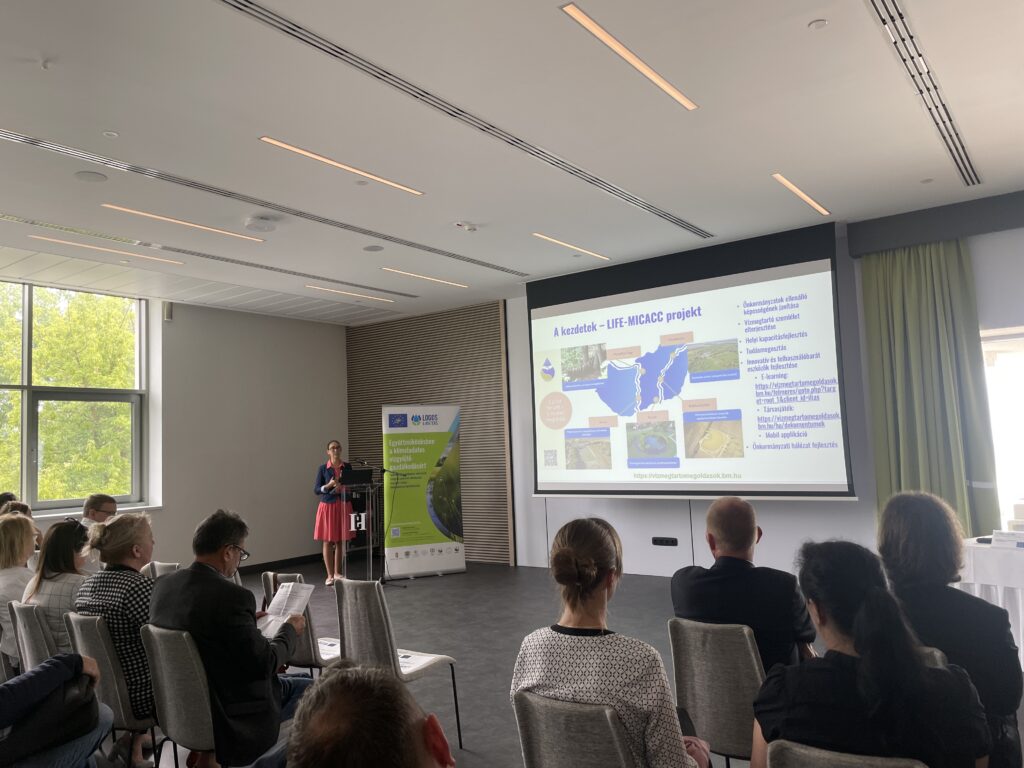
dr. Petra Szatzker, project manager of LIFE LOGOS 4 WATERS project presents the project and the preliminary LIFE-MICACC project at the event in Keszthely (06.06.2023)
The first presentations were followed by the presentations of the two demonstration water catchment areas of the LIFE LOGOS 4 WATERS project. The mayors of the municipalities of Bátya and Püspökszilágy (Csaba Fekete, Sándor Tordai), as well as the water catchment coordinators of the settlements (Fruzsina Markó, Krisztián Mészáros) presented in detail the nature-based solutions implemented in their areas during the LIFE-MICACC project, which provide effective answers to the water management problems challenging their settlements to this day. Then they presented what further interventions planned to be carried out within the framework of the LIFE LOGOS 4 WATERS project, which are now implemented on a small water catchment level in cooperation with the neighbouring municipalities. In the case of Bátya, located in a lowland area, drought and the decreasing level of groundwater were previously the main problem, where they tried to reduce the negative effects by creating reservoirs. Püspökszilágy is located in a hilly area, where flash floods followed by long periods of lack of precipitation caused significant damage to the settlement in recent years. In high-lying, forested areas, logs are used to catch and slow down the runoff, thereby protecting the built-up areas from flooding and sediment accumulating. The gradual infiltration of precipitation contributes to the recharge of groundwater resources, which helps to balance the differences between wet and dry periods. The log dams and side reservoirs have been successfully tested several times after their implementation, mainly during flash floods experienced in recent weeks.
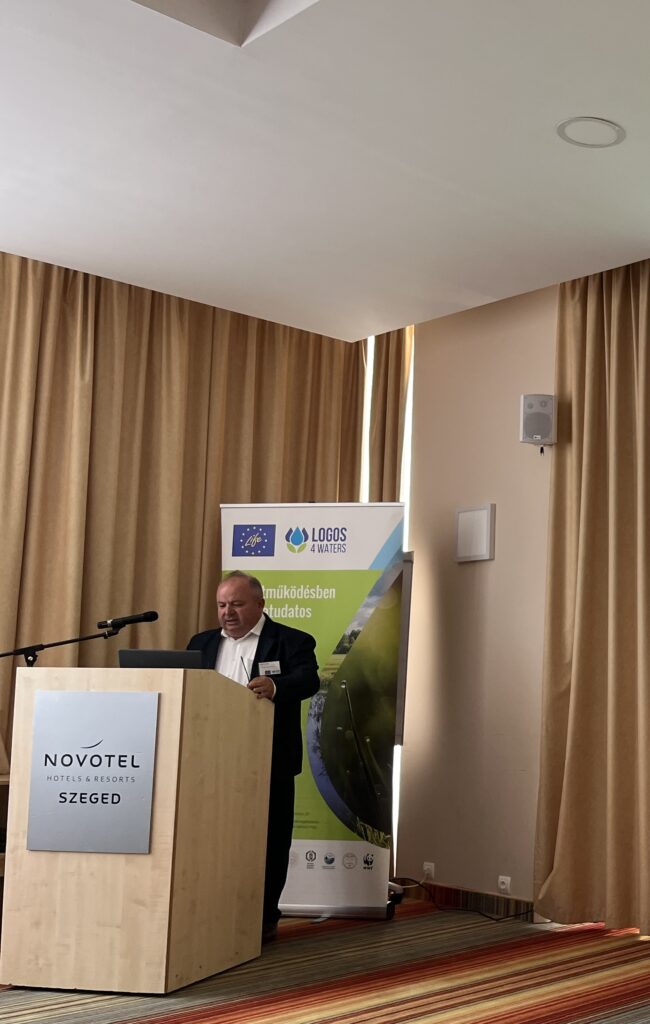
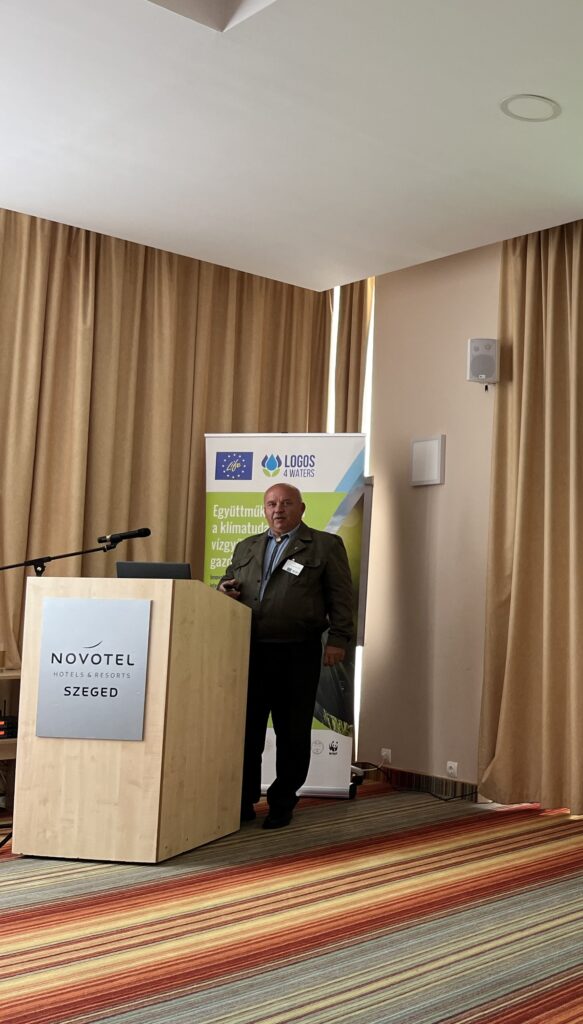
Csaba Fekete, Mayor of the Municipality of Bátya (first picture) and Sándor Tordai, Mayor of the Municipality of Püspökszilágy (second picture) present the nature-based solutions and natural water retention measures, such as the runoff reducer solutions implemented and planned in their settlements at the event in Szeged (25.05.2023)
At the end of the first block of the events, the experts of the Association of Climate Friendly Settlements (Gábor László Porhajas, Bence Álmos Kiss) presented the Catchment Support Programme. More information about the programme is available on the website of the LIFE LOGOS 4 WATERS project and on the website of the Association of Climate Friendly Municipalities.
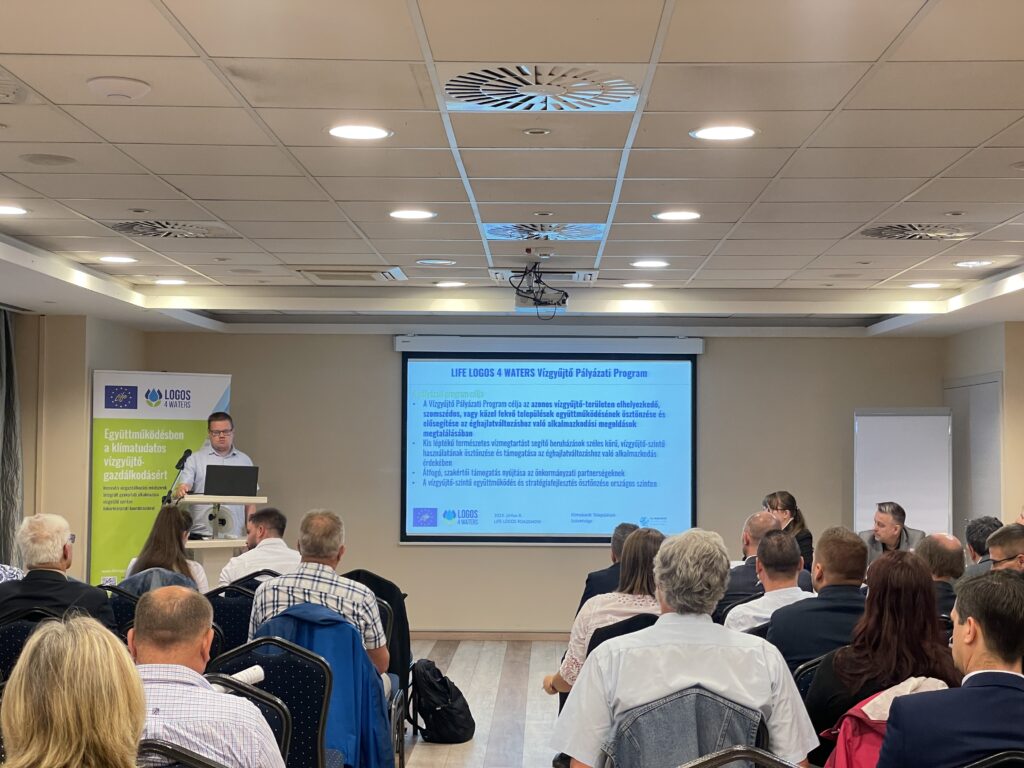
Gábor László Porhajas, climate advisor of the Association of Climate Friendly Settlements presents the Catchment Support Programme at the event in Miskolc (08.06.2023)
In the second block, several other good practices, domestic examples implemented or being in the process of implementation, including the good practices of settlements supported within the framework of last year’s Municipal Support Programme were showed and some international solutions also played a role among the presentations. In the case of Hungarian examples, several levels appeared: from the level of municipalities to the street level or the individual, the participants could gain information about some ideas and suggestions regarding nature-based solutions. To name just a few examples, we can highlight the inland and rainwater reservoir in Rákócziújfalu, the effects of the rehabilitation of the Boronka-stream by land embankments in Nagybajom improving water balance and creating habitat, the Benjes-hedge in Füzérradvány, the idea of creating rain gardens in Tata, or the popular rainwater collection containers in Gyenesdiás. All solutions are relatively small-scale, can be implemented with little energy, time and money investment, so perhaps their application will become more and more popular in the short term. On the other hand, their impact can be felt greatly in the long run.
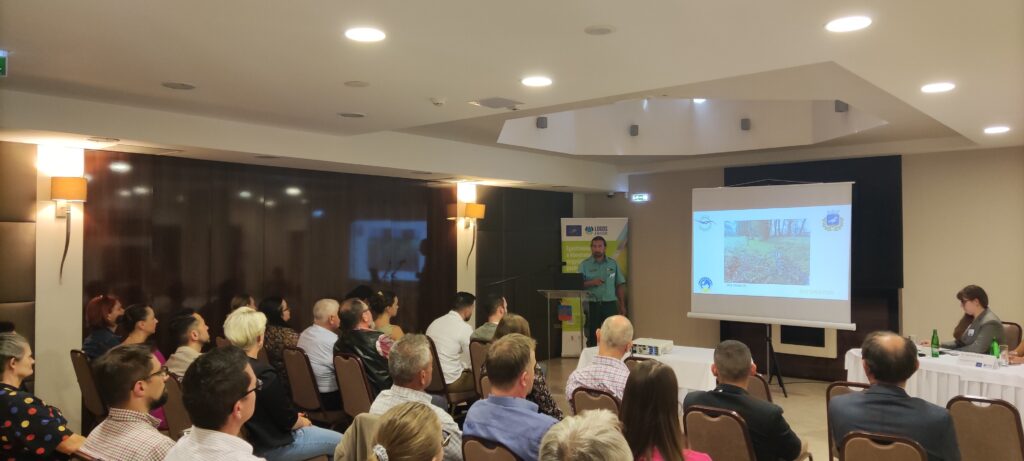
Tamás Nyemcsok, Head of the Somogy-Tolnai Region of the Danube-Drava National Park Directorate presents the results of the rehabilitation of Boronka-stream implemented in Nagybajom at the event in Szekszárd (15.06.2023)
Among the presentations, the Integrated Municipal Water Management Plan compiled by the General Directorate of Water Management and the Hungarian Chamber of Engineers was briefly presented as a planning aid. The role of the Plan in municipal decision-making and strategy development was also emphasized by the speakers (Csaba Ivaskó, dr. László Balatonyi and Béla Jancsó), who also highlighted the importance of cooperation and drew attention to that municipalities should prepare this plan not only out of necessity or obligation, but also because it allows them to map their water management situation, problems, difficulties better and form their future plans effectively.
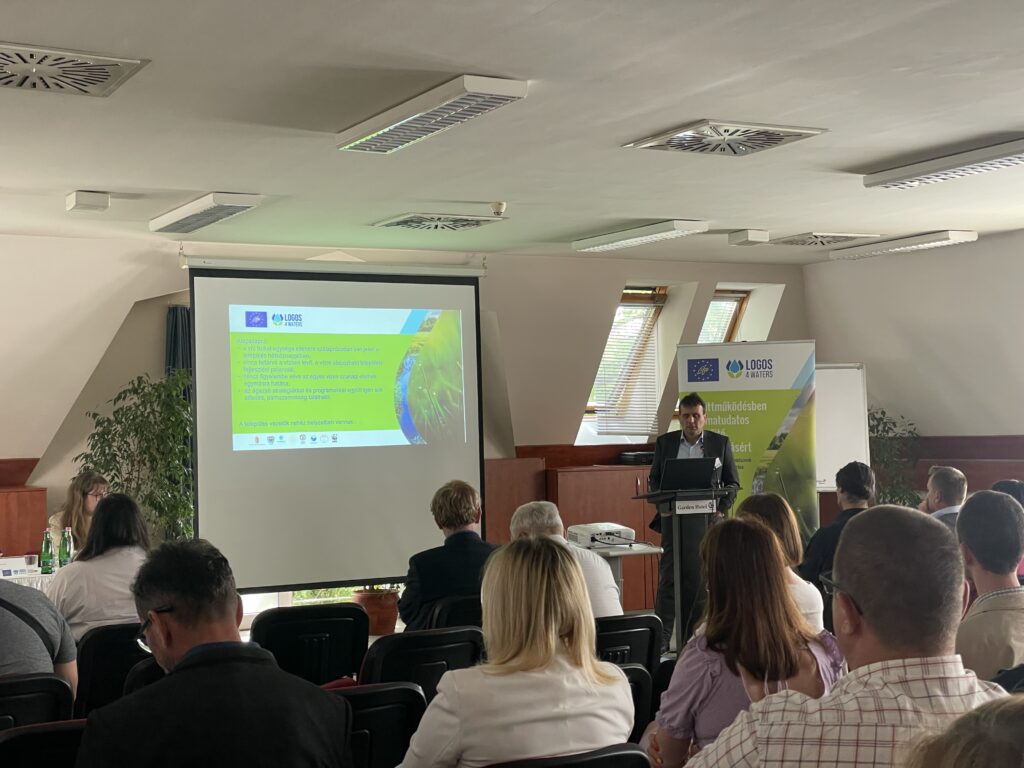
Béla Jancsó, President of the Water Management and Hydraulic Engineering Section of the Hungarian Chamber of Engineers presents the Integrated Municipal Water Management Plan at the event in Szolnok (13.06.2023)
During the last part of the events, two new Interreg projects – partly related to nature-based solutions – were presented, implemented by the Coordination Office for Municipalities of the Ministry of Interior. Within the framework of the LOCALIENCE project, local resilience to extreme weather events will be analysed and compared with the involvement of Central European countries. In addition to increasing resilience based on prevention, the Interreg Central project also focuses on the effective support of disaster management. In the case of the NBS4LOCAL project, the integration of nature-based solutions into the policy environment is analysed and interpreted also on international level, comparing the policy systems of several countries. The Interreg Europe project places great emphasis on stakeholder involvement to ensure that the funding structure is tailored to the needs that actually exist. Work started in both projects a few months ago, so the project managers (Eszter Laib, Petra Csizmadia) presented the main goals, expected results and applied methods in their presentations.
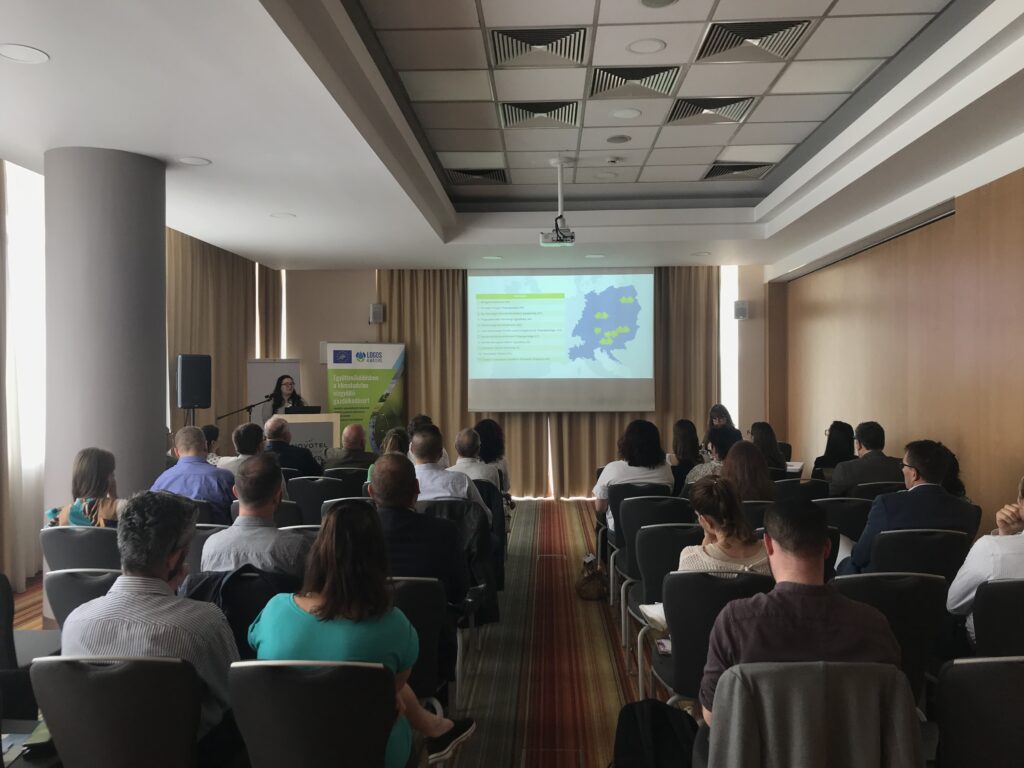
Petra Csizmadia, the project manager of the LOCALIENCE project, presents the project’s goals at the event in Szeged (25.05.2023)
At the end of the events, the coordinators (Szilvia Simon, Norbert Szendi, Sára Jakab) of the project entitled Local Public Service Information System outlined the current and post-development data set and operation of it which enables local municipalities to access a large number of data in a structured form and thus functions as a decision support system.
The main theme of the events focused on the fight against the effects of climate change, its possible methods and the exploration of the challenges arising as a result of extreme weather events. The actuality of these events is proven by the severe weather situations that actually developed in Hungary during the series of events – perhaps we can say without exaggeration that the most pressing climate change problems appeared in many parts of the country in the past few weeks as “demonstrations”. These (damage) events – among which we can mention the huge amount of rainfall in a short time, which generated flash floods, unfortunately also claiming human lives in Gyöngyöstarján, at the foot of the Mátra; or the relatively rare wind phenomenon in Hungary, the tornado in Miskolc, which the locals had to experience during the event there – they amplify the need and necessity to do something even more. We believe – and the outstanding number of people interested in the series of events confirms this – that the nature-based solutions already implemented in several locations in our country, and in particular those methods that retain water, or slow down runoff, can serve as an example for other municipalities and become more and more widespread throughout the country. We live in an era of challenges, when weather records follow each other as the years change, or we can experience them alternately within a given year. The most important ones relate mainly to water management: where severe drought threatens crop security and thus induces a food crisis, or flash flooding, which so often occurs nowadays, causes significant problems and even endangers life, or areas flooded with inland water for a long time give a challenge to agriculture. The results of successfully implemented projects also reflect – an excellent example of which is the case of the formerly mentioned Püspökszilágy – that it is worthwhile, indeed extremely important and advantageous, to reach back to the opportunities offered by nature in order to provide the most effective answers to the climate challenges and types of problem arising in a given area. For the implementation of all these projects and methods, cooperation and awareness-raising are essential: cooperation between local municipalities (since the effects of climate change know no administrative borders), cooperation between citizens, civil society, experts, authorities and municipal leaders (thus increasing the effectiveness of interventions). Awareness-raising has become conspicuous many times and in different ways as a result of the responses to current challenges. One of the challenges of nowadays is climate change and the issue of water management. We need to achieve that nature-based solutions will be socially accepted as much as possible, as this is the only way to balance artificial and natural environment. Awareness-raising is reflected in education, adult education, individual projects, various programmes, research works and events – we hope that the presentations showed during the series of the events have served this purpose successfully.
On behalf of the partnership with the LIFE LOGOS 4 WATERS project, we would like to thank you again for your kind interest and participation in our events. We hope that the participants have enriched themselves with new results and experiences by listening to the lectures personally or just reading the material of them (the lectures are available on the links at the end of our article), which, if implemented in cooperation, can have a good effect and serve as an example for their development and support in their fight against the effects of climate change. In the words of Jane Goodall, “Think globally, act locally.”
The presentations delivered within the framework of the series of the events are available at the following links:
Szeged, Tata, Visegrád, Keszthely, Miskolc, Szolnok, Szekszárd
